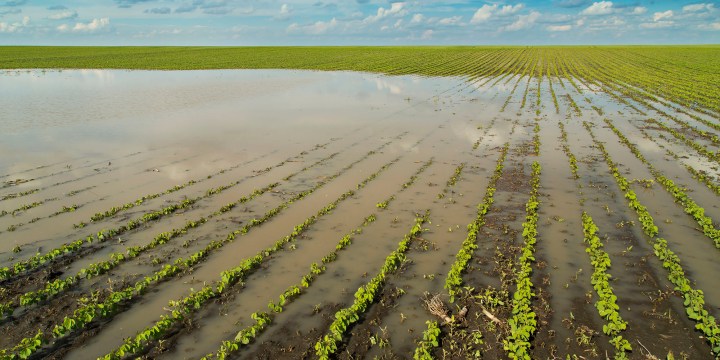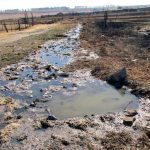DELUGE & DISASTER
Farmers in despair as SA floods sweep away crops, infrastructure and profits

The latest round of floods have washed away crops and roads, and devastated farming infrastructure in Eastern Cape, KwaZulu-Natal and Mpumalanga.
Farmers in Eastern Cape, KwaZulu-Natal and Mpumalanga are still counting their losses after severe floods over the past week.
Eastern Cape farmer Luvo Kiyane said dams had overflowed and their walls had broken due to the recent floods.
“Our fences have been swept away and we have lost a lot of crops. The maize that we have planted has turned yellow as it is in the water and there are no chances that it will grow again,” said Kiyane.
He said farmers had lost animals due to unknown diseases since last week’s floods.
“We are trying to vaccinate them for one disease but you notice that they have another and it is hard for us to maintain this,” he said.
Road damage
According to Kiyane, the floods have swept away all the access roads to farms in the area and farmers are forced to leave their cars at the tar road and walk long distances to get to their farms.
“After walking long roads to the farms, we can’t get inside the gardens to spray and kill the weeds. The situation is bad and there are no words to express it,” he said.
Another Eastern Cape farmer, Simon Sutton, said the biggest damage caused by the floods was to roads and fences.
“Some farmers have had their dam walls break due to the floods. The other huge problem is the municipal roads that are not fixed. The water swept them away and this will be a big problem when we have big trucks to come and collect the produce,” he said.
He said the problem with roads had been ongoing. Some had not been repaired for more than two years.
“The floods have made the roads even worse,” said Sutton.
Irrigation challenges loom
South African Canegrowers CEO Thomas Funke said parts of Mpumalanga and KwaZulu-Natal had seen severe flooding and extensive damage.
“One of the main concerns is the effect of the flooding on pump houses along rivers. Many growers – especially small-scale growers – were not able to remove their suction points and pumps to higher ground in time; removing this equipment is costly and requires heavy machinery. Moreover, with some pump stations now completely demolished, small-scale growers are likely to suffer further hardship as the irrigation challenges caused by load shedding are exacerbated,” he said.
Funke said in addition to pump stations, there had been significant damage to roadways, low-lying bridges and smaller river systems.
“Similarly, SA Canegrowers is receiving reports of extensive in-field damage. We therefore welcome the declaration of a State of Disaster to address the flood damage and trust that the relief effort will be rolled out quickly,” he said.
He said it was still too early to provide data on the extent of the damage suffered by growers.
“SA Canegrowers is working with its members to complete an industry-wide damage assessment, and we are monitoring the impact of further rainfall expected this week,” said Funke.
Bennie van Zyl, general manager of the agricultural organisation Transvaalse Landbou-Unie (TLU SA) said those living next to flooding rivers might have problems with their pumps and electric motors.
“That is a huge cost to the farmers as they need to irrigate their crops. The other problem is the infrastructure and that all [differs] from farm to farm,” he said.
Intense downpours
Nancy O’Farrell of the Crocodile River Major Irrigation Board in Mpumalanga said the rain had been catastrophic.
“The rain that was received on Tuesday night to Thursday morning last week caught a lot of people by surprise as the areas measured between 200 to 300mm in just eight hours. It was an astronomical amount of water that fell in a short period of time through the night,” said O’Farrell.
She said the rivers came down extremely fast, farmers downstream were caught unaware and their pump stations were still underwater.
“After [the] Thursday rains we had rain continuously and we are still on level nine rainfall warning. Before this happened we were on level five. I don’t think anyone anticipated what would have happened,” she said.
She said there had been a lot of damage in the area and the river levels were still high.
Visit Daily Maverick’s home page for more news, analysis and investigations
“Nobody can get in the water to pull out the pumps and know what the damage is. Every single pump and pump house, both the Komati and the Crocodile rivers, are still underwater and farmers are unable to pull out the pumps and know what the damage is,” she said.
O’Farrell said the ground in the area was still wet and she didn’t think it would absorb any further rain. Meanwhile, heavy rains are predicted in the province until Sunday.
Andrea Campher, Agri SA’s risk and disaster manager, welcomed the declaration of the State of Disaster addressing the damage caused by the floods in Eastern Cape, Mpumalanga, Gauteng, KwaZulu-Natal, Limpopo, Free State and North West.
“As farmers face untold damage to their produce, property and livelihoods, the declaration must be followed by the deployment of resources to provide relief to farmers and rebuild critical infrastructure damaged by the floods,” she said.
KZN catastrophe
“In addition to damaging private property, the floods have destroyed critical infrastructure. In parts of KwaZulu-Natal, where floods in 2022 had already caused significant damage, the result is catastrophic,” said Campher.
She urged Cooperative Governance and Traditional Affairs Minister Nkosazana Dlamini Zuma to put measures in place to ensure the deployment of relief funding in a transparent and accountable manner.
“We trust that the National Disaster Management Centre (NDMC) and the Auditor-General’s office will play their role in this regard. Agri SA will continue to monitor the situation and provide updates to members through our collaboration with the NDMC.
“We encourage farmers to complete impact assessments provided by the respective provincial disaster management centres to account for the damages suffered due to inclement weather,” said Campher. DM/OBP





















Comments - Please login in order to comment.